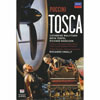Puccini Tosca
Sex, crime and a magnificent Scarpia in this ‘truthful’ Tosca
View record and artist detailsRecord and Artist Details
Composer or Director: Giacomo Puccini
Genre:
DVD
Label: Decca
Magazine Review Date: 13/2007
Media Format: Digital Versatile Disc
Media Runtime: 137
Mastering:
Stereo
DDD
Catalogue Number: 074 3201DH

Tracks:
| Composition | Artist Credit |
|---|---|
| Tosca |
Giacomo Puccini, Composer
(Royal) Concertgebouw Orchestra, Amsterdam Andreas Burkhart, Shepherd Boy, Treble/boy soprano Bryn Terfel, Scarpia, Baritone Catherine Malfitano, Tosca, Soprano Enrico Fissore, Sacristan, Bass Giacomo Puccini, Composer Jef van Wersch, Sciarrone, Bass John Graham-Hall, Spoletta, Tenor Mario Luperi, Angelotti, Bass Riccardo Chailly, Conductor Richard Margison, Cavaradossi, Tenor Ton Kemperman, Gaoler, Bass |
Author: John Steane
This is a “strong” Tosca, using the adjective in the sense in which it is sometimes applied to language (meaning “thoroughly disgusting”). But then, you might say, that’s Tosca being true to itself: it tells of a thoroughly disgusting state of affairs, when a man can be arrested by party thugs, taken off to headquarters for torture and summary execution, and a woman is at the mercy of a dictator’s lust. Its official description is “a melodrama in three acts”, and a melodrama this is, with jeering villain, manly hero and distraught heroine. And as though to drive the point home, Tosca acts and is costumed and made up to look like an old-time star of the silent screen. To that extent we know it’s make-believe. There are also scenery and props to persuade us to take it for real. And the sets are heavy with symbols suggesting “significance”. But yes, it’s “strong”: a good Tosca, one might have to concede.
Certainly it has a good, no, a magnificent Scarpia. Terfel is in fine voice, and his acting and singing are as one. In both, his style is forceful without exaggeration or over-emphasis. Richard Margison is a likeable Cavaradossi, his well placed tenor reliably meeting the challenges of the role, and he himself, never a conventionally romantic figure, gaining sympathy notwithstanding. And Malfitano, a Tosca without any special vocal allure, exercises her personality and compels attention. A gaunt, sonorous Angelotti, a Sacristan who huffs and puffs effectively, and a Spoletta even nastier than his master, help to fill in the background. The Concertgebouw, subordinated in balance to the singers, play well under Riccardo Chailly’s enlightened direction.
For a “bonus” we are taken behind the scenes and instructed in “a story about sex and crime”. The booklet includes a note by the stage director, Nikolaus Lehnhoff, who explains his concept under the heading of “death-traps”. That is what the setting of all three acts (church, palace and prison) have in common; and in the end, he concludes, “Existence itself has become the human death-trap”. Deep.
Certainly it has a good, no, a magnificent Scarpia. Terfel is in fine voice, and his acting and singing are as one. In both, his style is forceful without exaggeration or over-emphasis. Richard Margison is a likeable Cavaradossi, his well placed tenor reliably meeting the challenges of the role, and he himself, never a conventionally romantic figure, gaining sympathy notwithstanding. And Malfitano, a Tosca without any special vocal allure, exercises her personality and compels attention. A gaunt, sonorous Angelotti, a Sacristan who huffs and puffs effectively, and a Spoletta even nastier than his master, help to fill in the background. The Concertgebouw, subordinated in balance to the singers, play well under Riccardo Chailly’s enlightened direction.
For a “bonus” we are taken behind the scenes and instructed in “a story about sex and crime”. The booklet includes a note by the stage director, Nikolaus Lehnhoff, who explains his concept under the heading of “death-traps”. That is what the setting of all three acts (church, palace and prison) have in common; and in the end, he concludes, “Existence itself has become the human death-trap”. Deep.
Discover the world's largest classical music catalogue with Presto Music.

Gramophone Digital Club
- Digital Edition
- Digital Archive
- Reviews Database
- Full website access
From £8.75 / month
Subscribe
Gramophone Full Club
- Print Edition
- Digital Edition
- Digital Archive
- Reviews Database
- Full website access
From £11.00 / month
Subscribe
If you are a library, university or other organisation that would be interested in an institutional subscription to Gramophone please click here for further information.




